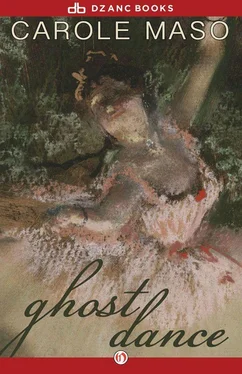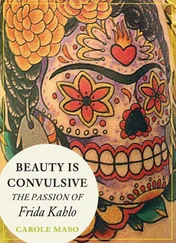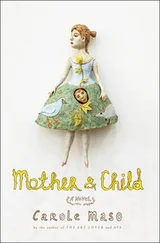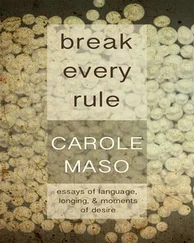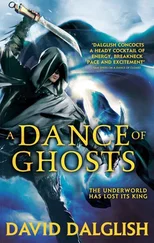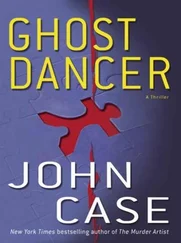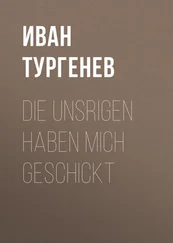“Vanessa,” she said, and she made a full turn for me slowly so that I might not miss anything: the intricately sewn costume, the beautiful hairdo with streamers, the red rosary. I wiped my eyes again. She turned once more and what I saw this time was the girlishness in her motion, the joy, the thrill; yes, it was joy I saw in her turned ankle! She pranced to one corner of the lawn, picked something up, and brought it back with her. It made a lovely sound. It was a tambourine she had made from tin pie plates, yarn, and bells.
“How inventive you are, Grandma! We never knew!”
She was humming something softly to herself — a beautiful, melancholy melody. I trembled, freezing suddenly on this July morning. She hummed louder and then began to sing. Her feet seemed to lift off the ground completely as she began her lilting, graceful, lighter-than-air dance. She took three steps to the right, slowly raised the tambourine and tapped it lightly, then three steps to the left, then a twirl. Instead of her regular black tie shoes she wore ballet slippers. When I saw her tiny feet in those slippers, I felt like going up and hugging her, but I did not dare disturb the dance; I was afraid that she might turn back into the old Grandma if I moved even one muscle. I held my breath.
“I never dreamt it would all come back so easily,” she said, and there was a lightness in her voice, a giddiness we had never heard before.
She moved more quickly now, having been bitten, I imagined, by the tarantula of Italian folklore, the spider with a venom so potent that it had made her people crazy for centuries with the irresistible urge to dance.
“How graceful you are, Grandma!”
She smiled at us. “We used to make our own pasta,” she said sweetly in her new singing voice. A weight had lifted from her. “We used to make little tortellini, ravioli. We used to make our own wine and olive oil. There were mountains there.”
She was surrounded by home. It wrapped around her finally with large, comforting arms — not our home, bannered and lit with fireworks, but hers.
“Oh, Grandma,” we said, “why didn’t you ever make us those little tortellini? Or tell us about the mountains? Why did you keep it all from us?”
Strains of familiar songs could be heard coming from inside the nursing home—“I’m a Yankee Doodle Dandy” and “America the Beautiful.” There was much excitement inside. Some were dressing to leave for the day — off to backyard celebrations. Others were getting ready for the geriatric parade of wheelchairs and walkers. Sparklers had been promised.
Grandma stopped suddenly and looked directly at us. “Your grandfather never let me speak Italian in the house,” she said. “He never let me cook my own food. I missed that so much,” she said in the loneliest voice I had ever heard. “He never let me sing you to sleep with the sweet songs from Italy I loved so much.” My father put his face in his hands.
I thought of my grandfather as a young man in Italy straining toward some idea of America. I thought of him coming here, his dreams of being a real American — eating steaks and eggs, wearing good shoes, making a life — and then another idea, some time later, something quite different, though unmistakably American, too.
A marching band could be heard somewhere in the distance.
“Oh, Angelo!” she said, looking to the sky. “I could have made an Easter torta for the children. I could have sung them the songs my mother sang. There were so many songs to sing.”
“Mom,” my father said. There were great tears in his eyes. “Why didn’t you say something to him?”
“It was not my place,” she said sadly.
“Oh, Mom,” he said. He walked slowly to her. “I never knew,” he whispered to her, looking into her darkened eyes.
“Mother,” he said, squeezing her ancient hands in his. “We’ve wanted the same thing all along. Why…” His voice trailed off. He kissed her hands and rubbed them against his face. “Why? Why have we fought?” he asked. She shook her head, lowered it.
“My bambino, my beautiful, curly-headed bambino. You had the most beautiful curls.”
My father turned to us for what seemed the first time in his life and gestured for us to come forward and enter the circle he and his mother had made with their arms. We hugged each other, all four of us. I ran my fingers through my grandmother’s hair and streamers.
“My children,” she whispered, “my children.” I felt our arms around her. She would die in the afternoon of this embrace. She was making her peace with us and with the world at the last moment — and we with her.
“Grandma,” I said, “I like your shoes.”
“Oh,” she said, looking at them and pointing her toe. “I’ve been saving these shoes for a lifetime.”
“Grandma,” Hetcher said, “that’s a nice tambourine.”
“I made it in crafts,” she said. “You know, my people always loved music. My father played the mandolin like an angel.”
On hearing this something rose in my father like an anthem and he began to weep uncontrollably and embraced his mother tighter.
“Michael,” she said, “I’m so sorry.” And he nodded. His head was pressed against her bosom, which seemed larger, more maternal somehow, softer. My father left his head on that wonderful place for a long time; when he finally looked up, her face was lined suddenly with the past.
“We used to eat these,” she said, bending over and plucking a dandelion from the green lawn. “We used to like these very much. A simple weed. We cooked it with garlic and olive oil and a few flakes of red pepper. We ate weeds and we were happy.”
My grandmother waved her arms above her head in some private choreography now, bending over and brushing her ankles in a wide, delicate sweep, a graceful rhythmic gesture.
She was humming the tarantella again. She separated from us and whirled and whirled, moving one hand to her eyes as if shading them from some brutal Italian sun.
“Piccolini,” she said. “The piccolini—” I thought those tiny fish must be tickling her childhood ankles. “The piccolini,” she smiled. To whom was she speaking? Not to us anymore — to her mother, I think. There was wonder in her voice, the wonder a daughter has for her mother when they are seeing the same thing for the first time. She pointed into the grass. “The piccolini.”
Already explosions could be heard far off. Something would burst in her head as bright, as spectacular as the year’s bicentennial display.
She danced now more quickly and continued to sing louder and louder as she whirled from one side of the large nursing home lawn to the other, spinning away from us, further and further away with each gesture. But then she came closer and seemed to focus for one moment, halting the dance with this last memory, arrested by it. She looked right at us. “We used to make little Christmas cakes of honey,” she whispered. “We called it strufoli. It was very good.” Slowly she began to dance again.
She shook her head with amazement. “I can taste it right now,” she said. Her eyes were wide. She stopped. One foot was pointed into the earth, one arm raised toward the sky. “It tastes so sweet,” she said, “just like I remember.” She closed her eyes and smiled.
Though it is the middle of the night and we are both in our nightgowns, our meeting is formal. She appears in the doorway of my bedroom holding a fistful of pens and pencils as she has so many times. Her hair, as always, is falling from the bun she wears to work. As always she looks exhausted. But this time is different. This time my mother steps forward. This time my mother is going to speak. She sits close to me on the bed. I look into her face and, much to my surprise, I see things I have never seen before, though I thought that surely I had memorized that face. There is new beauty there — or more beauty, though that scarcely seems possible. The moon is out, the stars, but it is Venus that dominates the sky, and I watch my mother intently against that fantastic backdrop. I love you so much, I will love you forever, I think. I watch her put her pencils in her pocket. Her lovely white hand falls to the bedspread.
Читать дальше
